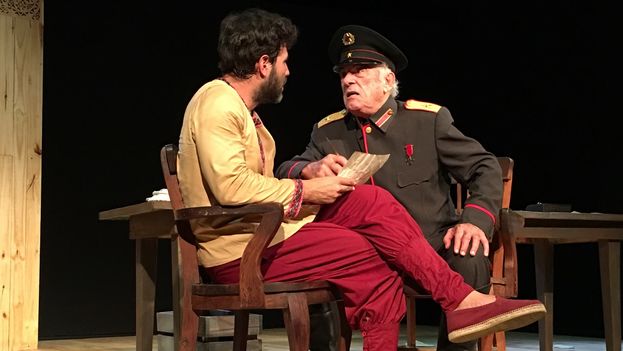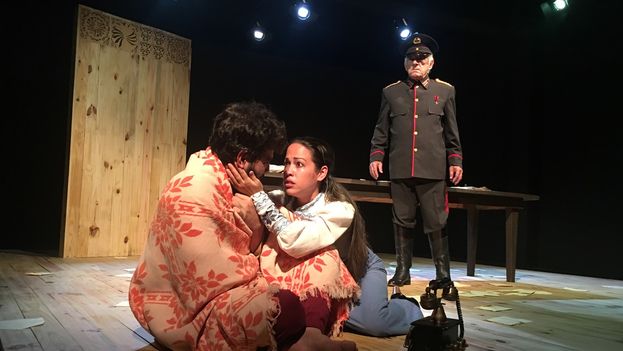
![]() 14ymedio, Reinaldo Escobar, Havana, 25 September 2017 — When leaving the Argos Theater after the performance of Love Letters to Stalin, a good part of the audience needs to shake their heads. Like someone waking from a nightmare, there will be those who, for long minutes, fear that the monsters from the dream might appear around the next corner.
14ymedio, Reinaldo Escobar, Havana, 25 September 2017 — When leaving the Argos Theater after the performance of Love Letters to Stalin, a good part of the audience needs to shake their heads. Like someone waking from a nightmare, there will be those who, for long minutes, fear that the monsters from the dream might appear around the next corner.
The play, with the original text by Spaniard Juan Mayorga, brings to the stage the drama experienced by the writer Mikhail Bulgakov (born Kiev, 1891) given his tense relationship with the Soviet Government. The author of novels such as The White Guard became known on the Island thanks to his book The Master and Margarita (1926), which could only be published 26 years after his death.
The piece, directed by Abel González Melo, tackles the thorny issue of the interaction between intellectuals and power, a bond that is stretched thin when rulers exercise strict censorship and the freedom of the artist is mired in the marshes of politics.
Although complacent art, which sings praises to tyrants, rarely survives the fall of dictatorships, the script suggests that the irreverent pay a high personal and editorial cost to transcend the sterilizing whims of power. In the words of the protagonist in Love Letters to Stalin: “An artist who is silent is not a real artist … How can I write songs to a country that for me is like a prison?”
In the small theater on Ayestaran Street the audience watches the scenes in which Bulgakov writes letters to the Soviet dictator Joseph Stalin (1879-1953) denouncing that performances of the play The Purple Island have been prohibited. The writer also complains that the play The Days of the Turbins was barred and that Zoe’s Apartment was removed from the listings.
“I do not have the courage to live in a country where I can neither represent nor publish my works. I am writing to you so that you will return to me my freedom as a writer or expel me from the Soviet Union with my wife,” he cries in his letter.
According to Bulgakov’s biographers, Stalin responded to this letter in 1930 with a telephone call. In the scene in which the sound of the ringing phone is heard, the actor Alberto Corona – who represents the writer – jumps for joy and embraces his wife, played by Liliana Lam. Full of glee he shouts: “Comrade Stalin has called me!”

However, the communication remains unfinished due to technical problems at the moment when Stalin was about to schedule a personal encounter with the artist. From that moment, the novelist and playwright does nothing more than write new missives and stay home waiting for the phone to ring again. “All I have written is a child’s play if I compare it with a letter to Stalin,” he says.
Desperation leads Bulgakov to the delirium of imagining that he sees, standing in the middle of his living room, the unmistakable figure of the dictator, brought to life by the actor Pancho Garcia, winner of the 2012 National Theater Award.
The specter of Stalin that dialogues with the writer is not only that iron man who orders the death of his fellow combatants, but also the magnanimous chief who feels “surrounded by the incompetent” and who wishes to sit down and converse with an uncomfortable intellectual to hear his views about the future of the country.
A Stalin who, at the same time, shows his darker side. A rogue who “has almost driven our friend Zamiatin crazy, and has succeeded in getting Maiakosvki to commit suicide,” says Bulgakov. The innocent idealization of that Stalin also represents the writer’s last hope of becoming accepted without having to give up himself.
The need to prove that he is not on the side of enemies, his love of the country where his writing is nourished, and growing unease because his work is pushed aside, weave the fall of the Russian writer. A descent into the abyss of ostracism, from which only a pact with the censor could save him.
“I suspect that in Cuba in 2017, some of his phrases and situations will be heard and observed as they have not been anywhere else,” said the author, Juan Mayorga. Comparisons between that USSR and a Cuba where, for years, critical authors were penalized with an exclusion from the catalogs of published books, a ban on travel and the execution of their reputations.
The staging of Love Letters to Stalin in a theater in Havana reopens the debate on the consequences of decades of censorship and control over cultural production and over the island’s intellectuals. From Fidel Castro’s Words to the Intellectuals, to the arrest of graffiti artist Danilo Maldonado, all the stories of exclusion or submission of an artist parade in the minds of the spectators.
Thus, Bulgakov becomes at times Virgilio Piñera, Heberto Padilla and Maria Elena Cruz Varela. For moments he also longed to be closer to the authorities and enjoy the status of a novelist pampered by institutions, in the style of Manuel Cofiño, Miguel Barnet or Abel Prieto. Only to finally discover in his own experience that authoritarians do not seek writers but propagandists; they prefer slogans over literature.
